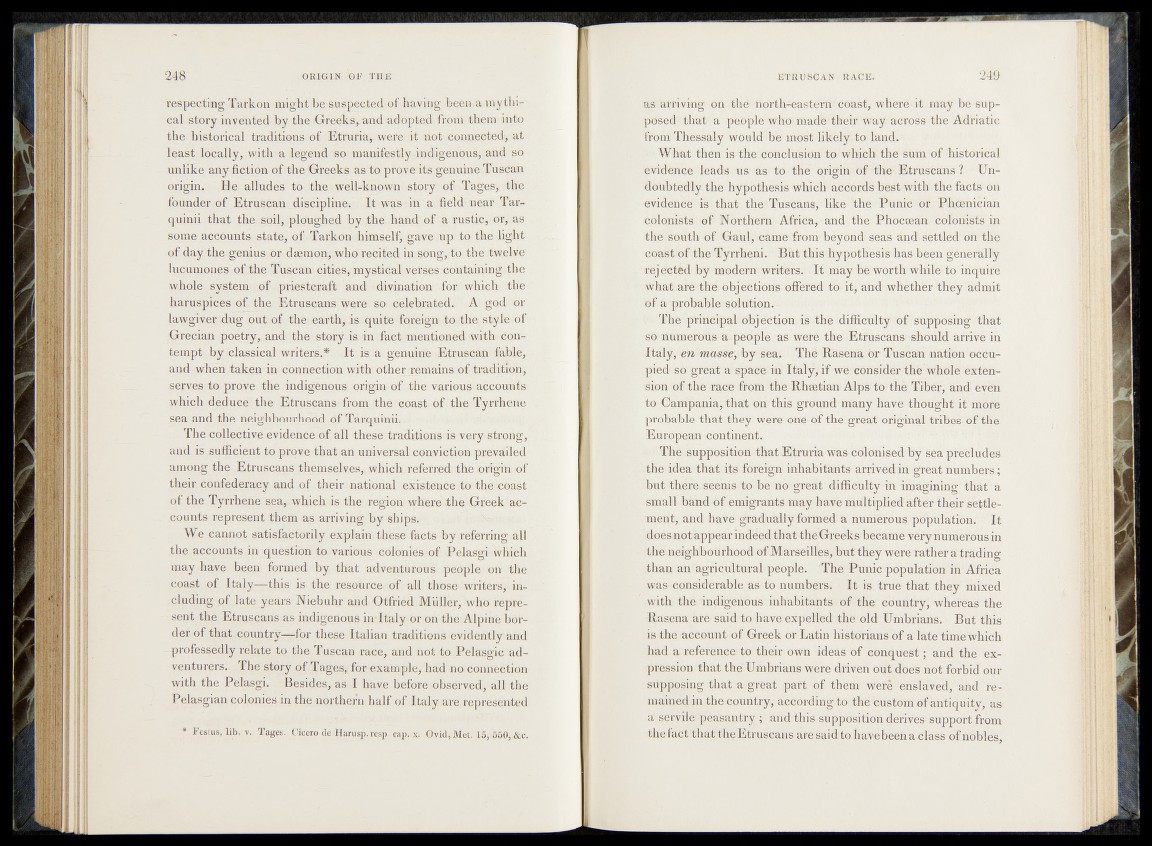
respecting Tarkon might be suspected;of havingbeen.a mythical
story invented by the Gree'ks, and adopted from them into
the historical traditions of Etruria, were it no t connected', <at
least locally, with a legend so manifestly .indigenous, and. so
unlike any fiction of the Greeks as to.prove its genuine Tuscan
origin. He alludes to the well-known story of-Tfges, the
founder of Etruscan discipline. It was - in a field near Tar-
quinii that the ghil, ploughed by the hand of a rusticjvor, as
some accounts state, of Tarkom»himself, gave upr to the light
of day the genius .‘or daemon^who recited imsong,4o the twelve
lucumones of th e Tuscan cities, mystical verses containing the
whole »system of -priestcraft and divination for which the
haruspices of the Etruscans were-'so celebrated. A god, or
lawgiver dug bu t of the earth, is quite foreign, to-thefstyle of
Grecian poetry, and the story is in fact mentioned with; Contempt
by classical writers.* It is a genuine Etruscan fable,
and when taken in connection with other remains of tradition,
serves to prove the indigenous, origin- of the various; accounts
which ded uce the Etruscans from the coast of the Tyrrhene
sea and the neighbourhood of Tarquinii.
The collective evidence of all these;tradiiibhfc4#;^pryi>^(rong,
and is sufficient to prove that an universal conviction prevailed
among the Etruscans themselves, which-referred the originibf
their confederacy and of their national existence to the:;cbast
of the Tyrrhene spa, which is the region where the Gieek a c counts
represent them as arriving by ships.
We cannot satisfactorily- explain, these facts by referring all
the accounts in question to various .colonies of Pelasgi which
may have been formed by that adventurous people on the
coast of Italy—this is the resource of all those writers, including
of late years Niebuhr and Otfried Muller, who represent
the Etruscans as indigenous in*Italy or on the Alpine border
of that country—for these Italian traditions evidently and
professedly relate to the Tuscan race, and not to Pelasgic adventurers.
The story of Tages, for example, had no connection
with the Pelasgi. Besides, as I have before observed, all the
Pelasgian col onies in the northern half of Italy are represented
* Fesius, lib. v. Tages. Cicero de Harusp.resp cap. x. Ovid,Met. 15, 550, &c.
as arriving on the north-eastern coast, where-it may be sup-
pb&edf^th'at^aiiphbple whormatlh th'eir way ab b o ^ th e Adriatic
fr oiksTbesSaly* wo u Id" fem b s tdi k ely £ to- land. <
■ What then1 i‘S - th ^ ^ if4lnsionl)ife which the Sum of historical
evidence leads us.>ds?'to the originof’dlmiEtriiscans V ' Undoubtedly
t t e h y ^b th llp ’A^hicH^ae'iord’s besbwifh the facts on
evidenced is^that'the^Ptlstikns'," lik^dt-lfe Punic or Phoenician
colditiistst’^ef Noff hem Africa,' kndith'e Ehefeea%lpffenis1£s in
th^SOUithibf'Gauly cameSfipdid^'l^ohdlleta^andi; Settled' onrthb
ebast of* the Tyrrheh'i.-u But thikjh y p o th e sise s'b b en '^h e fa lly
Tijectftd by modern writers. It maybe worth while-tb'inquire
what are the 6byebtionsJ offered t l 5%; and^whethen%mey admit
of a probable? solution.
Thb-tprincipal.objection is-the difficulty of Sd|^pbsihg'that
*so>5nntoerous a* people' ^as were the ‘Etruscans * should arrivhdn
Italy, en massey/b y lsea. The'Rasena.br Tuscan natioir occupied
so'great a(space in Italyfiiw'e consider the whole extfefi-
Siobi'Ofehe’TafcO- from the Rhgetian’ AfpisHb' the,Tibet, and eyed
§f| Campania^hat erbthis gfd^d^'m’a n y m o r e
probable that they^dtfa&bnWbf thdfgrdalf'origmal tribes of the
European* continent.
The supposition that Etruria-was colonised by' S^precludhs',
the ideadhat-its foreign inhabitants arrived
but theJe* Seems to'be no! gfedt difficulty in imagining4 that 'a
sffiaH band o f emigrants may have multiplied after their-^ettit^-
ment, and have gradually forqied a numerBu^popiilation.1 I t
i doesnot appear indeed th at the Greeks became vefy numerous in
the neigbbotlrhood of Marseilles; but they wdfe'rather a trading
.than an agricultural peopled . The Punic population iu Africa
waS'Considerable as- to numbers; I t if true that they5 mixed
Vwith the indigenous inhabitants of the country;*whereas the
Rasena are saiddo«have expelled thfe old Umbrians. But this
is the account of Greek or Latin historians of a late time which
had a reference to their own ideas of conquest; arid the ex-
pressibn that thb Umbrians were driven out dbe^hot forbid otir
supposing that a great part of thenV-were enslaved, 'and remained
in the country,' according to? the custom of antf |u ity , as
a servile* peasantry ; and this supposition derives support from
the fact that the Etruscans are said to have been a class of nobles,